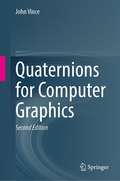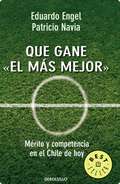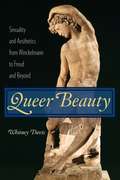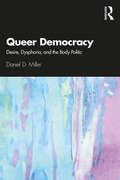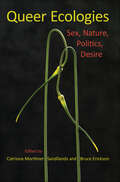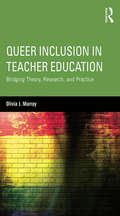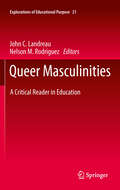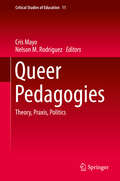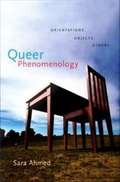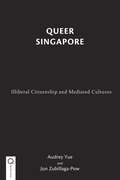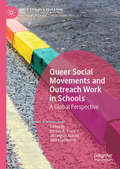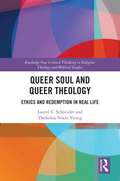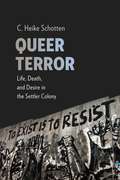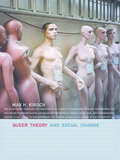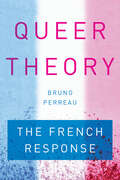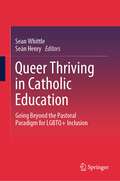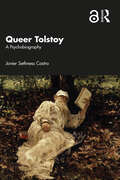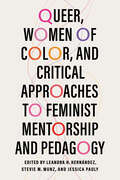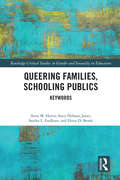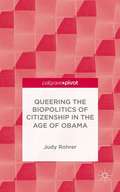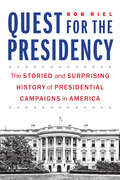- Table View
- List View
Quaternions for Computer Graphics
by John VinceIf you have ever wondered what quaternions are — then look no further, John Vince will show you how simple and useful they are. This 2nd edition has been completely revised and includes extra detail on the invention of quaternions, a complete review of the text and equations, all figures are in colour, extra worked examples, an expanded index, and a bibliography arranged for each chapter. Quaternions for Computer Graphics includes chapters on number sets and algebra, imaginary and complex numbers, the complex plane, rotation transforms, and a comprehensive description of quaternions in the context of rotation. The book will appeal to students of computer graphics, computer science and mathematics, as well as programmers, researchers, academics and professional practitioners interested in learning about quaternions. John Vince explains in an easy-to-understand language, with the aid of useful figures, how quaternions emerged, gave birth to modern vector analysis, disappeared, and reemerged to be adopted by the flight simulation industry and computer graphics. This book will give you the confidence to use quaternions within your every-day mathematics, and explore more advanced texts.
Que gane el más mejor
by Eduardo Engel Patricio Navia«Con gran lucidez los autores argumentan que si el Estado cumple a cabalidad su rol de igualar las oportunidades y proveer protección social para los débiles, la competencia aflora como el sistema más justo y eficiente en la adjudicación de roles.» Nicolás Eyzaguirre, ex ministro de Hacienda «El Chile de las diferencias abrumadoras, aquel donde cuentan decisivamente los contubernios del poder, la clase y hasta la raza, aparece al desnudo en este estupendo libro de lectura imprescindible.» Fernando Villegas, columnista y escritor «Los autores dejan en evidencia que estamos lejos de la igualdad de oportunidades. Con una mirada certera y aguda, ofrecen soluciones audaces, como aumentar la competencia no sólo entre las AFP, sino incluso entre los colegios de los barrios más pobres. Es un libro para quienes buscan dirigir y comprender el país.» Patricia Politzer, periodista «Para quien tenga interés en entender la evolución reciente de la sociedad chilena, este libro es un excepcional aporte, fresco y entretenido, muy fácil de leer.»Felipe Lamarca, economista
Queen and Country: The Fifty-Year Reign of Elizabeth II
by William ShawcrossDescribes the public persona of the Queen
Queenship and Voice in Medieval Northern Europe
by William Layher"Queenship and Voice in Medieval Northern Europe" offers a unique perspective on aspects of female rulership in the Scandinavian Middle Ages. Working with historical as well as literary evidence from the thirteenth to fifteenth centuries, this book shows how three queens - Agnes of Denmark, Eufemia of Norway, and Margareta, the union queen of the Scandinavian kingdoms - marshaled the power of the royal voice in order to effect political change. In conceptualizing the political landscape of late-medieval Scandinavia as an acoustic landscape, Layher charts a new path of historical and cultural analysis into the reach and resonance of royal power in the Middle Ages.
Queer Beauty: Sexuality and Aesthetics from Winckelmann to Freud and Beyond (Columbia Themes in Philosophy, Social Criticism, and the Arts)
by Whitney DavisThe pioneering work of Johann Winckelmann (1717-1768) identified a homoerotic appreciation of male beauty in classical Greek sculpture, a fascination that had endured in Western art since the Greeks. Yet after Winckelmann, the value (even the possibility) of art's queer beauty was often denied. Several theorists, notably the philosopher Immanuel Kant, broke sexual attraction and aesthetic appreciation into separate or dueling domains. In turn, sexual desire and aesthetic pleasure had to be profoundly rethought by later writers. Whitney Davis follows how such innovative thinkers as John Addington Symonds, Michel Foucault, and Richard Wollheim rejoined these two domains, reclaiming earlier insights about the mutual implication of sexuality and aesthetics. Addressing texts by Arthur Schopenhauer, Charles Darwin, Oscar Wilde, Vernon Lee, and Sigmund Freud, among many others, Davis criticizes modern approaches, such as Kantian idealism, Darwinism, psychoanalysis, and analytic aesthetics, for either reducing aesthetics to a question of sexuality or for removing sexuality from the aesthetic field altogether. Despite these schematic reductions, sexuality always returns to aesthetics, and aesthetic considerations always recur in sexuality. Davis particularly emphasizes the way in which philosophies of art since the late eighteenth century have responded to nonstandard sexuality, especially homoeroticism, and how theories of nonstandard sexuality have drawn on aesthetics in significant ways. Many imaginative and penetrating critics have wrestled productively, though often inconclusively and "against themselves," with the aesthetic making of sexual life and new forms of art made from reconstituted sexualities. Through a critique that confronts history, philosophy, science, psychology, and dominant theories of art and sexuality, Davis challenges privileged types of sexual and aesthetic creation imagined in modern culture-and assumed today.
Queer Democracy: Desire, Dysphoria, and the Body Politic
by Daniel D. MillerQueer Democracy undertakes an interdisciplinary critical investigation of the centuries-old metaphor of society as a body, drawing on queer and transgender accounts of embodiment as a constructive resource for reimagining politics and society. Daniel Miller argues that this metaphor has consistently expressed a desire for social and political order, grounded in the social body’s imagined normative shape or morphology. The consistent result, from the “concord” discourses of the pre-Christian Stoics, all the way through to contemporary nationalism and populism, has been the suppression of any dissent that would unmake the social body’s presumed normativity. Miller argues that the conception of embodiment at the heart of the metaphor is a fantasy, and that negative social and political reactions to dissent represent visceral, dysphoric responses to its reshaping of the social body. He argues that social body’s essential queerness, defined by fluidity and lack of a fixed morphology, spawns queer democracy, expressed through ongoing social and political practices that aim to extend liberty and equality to new social domains. Queer Democracy articulates a new departure for the ongoing development of theoretical articulations linking queer and trans theory with political theory. It will appeal to both academic and non-academic readers engaged in research on political theory, populism, US religion, gender studies, and queer studies.
Queer Ecologies: Sex, Nature, Politics, Desire
by Catriona Mortimer-Sandilands and Bruce EricksonTreating such issues as animal sex, species politics, environmental justice, lesbian space and "gay" ghettos, AIDS literatures, and queer nationalities, this lively collection asks important questions at the intersections of sexuality and environmental studies. Contributors from a wide range of disciplines present a focused engagement with the critical, philosophical, and political dimensions of sex and nature. These discussions are particularly relevant to current debates in many disciplines, including environmental studies, queer theory, critical race theory, philosophy, literary criticism, and politics. As a whole, Queer Ecologies stands as a powerful corrective to views that equate "natural" with "straight" while "queer" is held to be against nature.
Queer Inclusion in Teacher Education: Bridging Theory, Research, and Practice
by Olivia J. MurrayQueer Inclusion in Teacher Education explores the challenges and promises of building queer inclusive pedagogy and curriculum into teacher education. Weaving together theory, research findings, and practical "how-to" strategies and materials, it fills an important gap by offering a clear roadmap and resources for influencing the knowledge, beliefs, and actions of faculty working with pre-service teachers. While the book has implications for policy change, most immediately, readers will feel empowered with ideas for faculty development they can implement in their own teacher education programs. Looking at both the politics and practices of teacher education and the ways in which queer issues manifest in schools, it is hopeful in suggesting that if teachers and pre-service teachers can critically reflect on homophobia and heteronormativity, they can begin to think about and relate to queer youth in a different, more positive and inclusive way. A Companion Website [http://queerinclusion.com] with additional activities and materials for teacher educators and faculty development and a practical guide enhances the usefulness of the book.
Queer Kids and Social Violence: The Limits of Bullying
by Melissa J. Smith Elizabethe PayneChallenging the myths about LGBTQ+ kids and bullying: what it means to protect queer kids in schools Conversations around LGBTQ+ kids in school have become dominated by the subject of bullying. Although this may be due to good-faith efforts to protect vulnerable students, Queer Kids and Social Violence demonstrates that a focus on bullying as acts of individual peer aggression fails to address the social norms that perpetuate the violence. Considering the broader contexts of bullying, this volume offers ways to engage with queer youth that are both more humanizing and more likely to create sustainable change. Essays by leading international scholars analyze how bullying discourse shapes policy and practice, using in-depth case studies, research findings, and examinations of political policy to guide readers through the various forms of violence, identity regulation, and identity erasure in schools. Offering conversation-shifting interventions to respond to a difficult and frightening political moment for LGBTQ+ youth, Queer Kids and Social Violence is a rounded, empathetic picture that does queer youth justice and points the way toward safer schools for all. Contributors: Ana María Amigo-Ventureira, Durell M. Callier, Cristyn Davies, Renée DePalma, Tania Ferfolja, Jessica Fields, Elliot Fonarev, Jen Gilbert, Tristan Gleason, Dominique C. Hill, Angela Ingram, Laurie Gutmann Kahn, Cris Mayo, Mollie McQuillan, Aoife Neary, C.J. Pascoe, Victoria Rawlings, EJ Renold, Jessica Ringrose, Kerry H. Robinson, Dorte Marie Søndergaard, Cris Townley, Jacqueline Ullman, Boni Wozolek. Retail e-book files for this title are screen-reader friendly with images accompanied by short alt text and/or extended descriptions.
Queer Masculinities: A Critical Reader in Education
by Nelson Rodriguez John LandreauQueer Masculinities: A Critical Reader in Education is a substantial addition to the discussion of queer masculinities, of the interplay between queer masculinities and education, and to the political gender discourse as a whole. Enriching the discourse of masculinity politics, the cross-section of scholarly interrogations of the complexities and contradictions of queer masculinities in education demonstrates that any serious study of masculinity--hegemonic or otherwise--must consider the theoretical and political contributions that the concept of queer masculinity makes to a more comprehensive and nuanced understanding of masculinity itself. The essays adopt a range of approaches from empirical studies to reflective theorizing, and address themselves to three separate educational realms: the K-12 level, the collegiate level, and the level in popular culture, which could be called 'cultural pedagogy'. The wealth of detailed analysis includes, for example, the notion that normative expectations and projections on the part of teachers and administrators unnecessarily reinforce the values and behaviors of heteronormative masculinity, creating an institutionalized loop that disciplines masculinity. At the same time, and for this very reason, schools represent an opportunity to 'provide a setting where a broader menu can be introduced and gender/sexual meanings, expressions, and experiences boys encounter can create new possibilities of what it can mean to be male'. At the collegiate level chapters include analysis of what the authors call 'homosexualization of heterosexual men' on the university dance floor, while the chapters of the third section, on popular culture, include a fascinating analysis of the construction of queer 'counternarratives' that can be constructed watching TV shows of apparently hegemonic bent. In all, this volume's breadth and detail make it a landmark publication in the study of queer masculinities, and thus in critical masculinity studies as a whole.
Queer Pedagogies: Theory, Praxis, Politics (Critical Studies of Education #11)
by Nelson M. Rodriguez Cris MayoThis book invites readers to explore the critical interruptions occasioned by queer pedagogies. Building on earlier scholarly work in this area, as well as pedagogical production arising out of queer activism, the chapters in this volume examine a broad range of themes as they collectively grapple with the meaning and practice of queer pedagogy across different contexts. In this way, Queer Pedagogies provides a glance at new ways of thinking about and acting on contemporary educational topics and debates situated at the intersection of queer studies and education. In taking up the concept of queer pedagogy, the volume provides ample opportunities for scholars, educators, activists, and other cultural workers to critically engage with ongoing questions of theory, praxis, and politics.
Queer Phenomenology: Orientations, Objects, Others
by Sara AhmedIn this groundbreaking work, Sara Ahmed demonstrates how queer studies can put phenomenology to productive use. Focusing on the "orientation" aspect of "sexual orientation" and the "orient" in "orientalism," Ahmed examines what it means for bodies to be situated in space and time. Bodies take shape as they move through the world directing themselves toward or away from objects and others. Being "orientated" means feeling at home, knowing where one stands, or having certain objects within reach. Orientations affect what is proximate to the body or what can be reached. A queer phenomenology, Ahmed contends, reveals how social relations are arranged spatially, how queerness disrupts and reorders these relations by not following the accepted paths, and how a politics of disorientation puts other objects within reach, those that might, at first glance, seem awry. Ahmed proposes that a queer phenomenology might investigate not only how the concept of orientation is informed by phenomenology but also the orientation of phenomenology itself. Thus she reflects on the significance of the objects that appear--and those that do not--as signs of orientation in classic phenomenological texts such as Husserl's Ideas. In developing a queer model of orientations, she combines readings of phenomenological texts--by Husserl, Heidegger, Merleau-Ponty, and Fanon--with insights drawn from queer studies, feminist theory, critical race theory, Marxism, and psychoanalysis. Queer Phenomenology points queer theory in bold new directions.
Queer Singapore: Illiberal Citizenship and Mediated Cultures
by Audrey Yue Jun Zubillaga-PowSingapore remains one of the few countries in Asia that has yet to decriminalise homosexuality. Yet it has also been hailed by many as one of the emerging gay capitals of Asia. This book accounts for the rise of mediated queer cultures in Singapore's current milieu of illiberal citizenship. This collection analyses how contemporary queer Singapore has emerged against a contradictory backdrop of sexual repression and cultural liberalisation. Using the innovative framework of illiberal pragmatism, established and emergent local scholars and activists provide expansive coverage of the impact of homosexuality on Singapore's media cultures and political economy, including law, religion, the military, literature, theatre, photography, cinema, social media and queer commerce. It shows how new LGBT subjectivities have been fashioned through the governance of illiberal pragmatism, how pragmatism is appropriated as a form of social and critical democratic action, and how cultural citizenship is forged through a logic of queer complicity that complicates the flows of oppositional resistance and grassroots appropriation.
Queer Social Movements and Outreach Work in Schools: A Global Perspective (Queer Studies and Education)
by Dennis A. Francis Jón Ingvar Kjaran Jukka LehtonenThis book brings together leading scholars researching the field of gender, sexuality, schooling, queer activism, and social movements within different cultural contexts. With contributions from more than fifteen countries, the chapters bring fresh insights for students and scholars of gender and sexuality studies, education, and social movements in the Global North and South. The book draws together both theoretical and empirical contributions offering rich and multidisciplinary essays from scholars and activists in the field focusing on outreach work of QSM (Queer Social Movements) in schools, queer activism in educational settings, and the role of QSMs in supporting and informing queer youth.
Queer Soul and Queer Theology: Ethics and Redemption in Real Life (Routledge New Critical Thinking in Religion, Theology and Biblical Studies)
by Thelathia Nikki Young Laurel C. SchneiderThis book takes up the question of Christian queer theology and ethics through the contested lens of "redemption." Starting from the root verb "to deem," the authors argue that queer lives and struggles can illuminate and re-value the richness of embodied experience that is implied in Christian incarnational theology and ethics. Offering a set of virtues gleaned from contemporary lesbian, gay, bisexual, transgender, intersex, queer, and asexual (LGBTIQA) lives and communities, this book introduces a new framework of ethical reasoning. Battered and wrongly condemned by life-denying theologies of redemption and dessicating ethics of virtue, this book asserts that the resilience, creativity, and epistemology manifesting in queer lives and communities are essential to a more generous and liberative Christian theology. In this book, queer "virtues" not only reveal and re-value queer soul but expose covert viciousness in the traditional (i.e., inherently colonial and racist, and thus ungodly) "family values" of dominant Christian ethics and theology. It argues that such re-imagining has redemptive potential for Christian life writ large, including the redemption of God. This book will be a key resource for scholars of queer theology and ethics as well as queer theory, gender and race studies, religious studies, and theology more generally.
Queer Terror: Life, Death, and Desire in the Settler Colony (New Directions in Critical Theory #59)
by C. Heike SchottenAfter Sept. 11, 2001, George W. Bush declared, “Either you are with us, or you are with the terrorists.” Bush’s assertion was not simply jingoist bravado—it encapsulates the civilizationalist moralism that has motivated and defined the United States since its beginning, linking the War on Terror to the nation’s settlement and founding.In Queer Terror, C. Heike Schotten offers a critique of U.S. settler-colonial empire that draws on political, queer, and critical indigenous theory to situate Bush’s either/or moralism and reframe the concept of terrorism. The categories of the War on Terror exemplify the moralizing politics that insulate U.S. empire from critique, render its victims deserving of its abuses, and delegitimize resistance to it as unthinkable and perverse. Schotten provides an anatomy of this moralism, arguing for a new interpretation of biopolitics that is focused on sovereignty and desire rather than racism and biology. This rethinking of biopolitics puts critical political theory of empire in dialogue with the insights of both native studies and queer theory. Building on queer theory’s refusal of sanctity, propriety, and moralisms of all sorts, Schotten ultimately contends that the answer to Bush’s ultimatum is clear: dissidents must reject the false choice he presents and stand decisively against “us,” rejecting its moralism and the sanctity of its “life,” in order to further a truly emancipatory, decolonizing queer politics.
Queer Theory and Social Change
by Max H. KirschQueer Theory and Social Change argues that there is a crisis within Queer theory over whether or not its theories can actually deliver change.Max Kirsch presents a challenging alternative to the current fascination with post-modern analyses of identity, culture, and difference. It emphasizes the need for a discussion of the importance of communities and the role of globalization on queer movements.
Queer Theory: The French Response
by Bruno PerreauIn 2012 and 2013, masses of French citizens took to the streets to demonstrate against a bill on gay marriage. But demonstrators were not merely denouncing its damaging effects; they were also claiming that its origins lay in "gender theory," an ideology imported from the United States. By "gender theory" they meant queer theory in general and, more specifically, the work of noted scholar Judith Butler. Now French opponents to gay marriage, supported by the Vatican, are attacking school curricula that explore male/female equality, which they claim is further proof of gender theory's growing empire. They fear that this pro-homosexual propaganda will not only pervert young people, but destroy the French nation itself. What are the various facets of the French response to queer theory, from the mobilization of activists and the seminars of scholars to the emergence of queer media and the decision to translate this or that kind of book? Ironically, perceiving queer theory as a threat to France means overlooking the fact that queer theory itself has been largely inspired by French thinkers. By examining mutual influences across the Atlantic, Bruno Perreau analyzes changes in the idea of national identity in France and the United States. In the process, he offers a new theory of minority politics: an ongoing critique of norms is not only what gives rise to a feeling of belonging; it is the very thing that founds citizenship.
Queer Thriving in Catholic Education: Going Beyond the Pastoral Paradigm for LGBTQ+ Inclusion
by Sean Whittle Seán HenryThis book provides readers with the opportunity to go beyond anecdote and supposition in order to get a fuller grasp of research around Catholic education and LGBTQ+ matters. This is an edited collection of chapters which explores LGBTQ+ matters in relation to Catholic education. Although the field of Catholic Education Studies has grown exponentially over the past two decades, little if any attention has been published specifically about the place of LGBTQ+ students (and teachers) in the context of Catholic education. This edited book presents the various strands of research about Catholic education and LGBTQ+ inclusion. More specifically, this edited book of chapters addresses a number of broader themes including:• Is it possible for Catholic education to sit in harmony with the concerns of LGBTQ+ inclusive education?• What does it mean to ‘queer’ education at all? How does this sit in relation to Catholic perspectives on the purpose of Catholic education?• When it comes to LGBTQ+ issues in relation to Catholic education, what is the research agenda?• How might Catholic schools move beyond a ‘pastoral accommodation’ approach to LGBTQ+ students?• What does the evidence from research in Catholic schools indicate? Are they places of inclusion, hospitality, and welcome for LGBTQ+ young people?
Queer Tolstoy: A Psychobiography
by Javier Sethness CastroQueer Tolstoy is a multidimensional work combining psychoanalysis, political history, LGBTQ+ studies, sexology, ethics, and theology to explore the life and art of Count Lev Nikolaevich Tolstoy. Using a psychobiographical framework, Sethness Castro uncovers profoundly queer dimensions in Tolstoy’s life experiences and art. Deftly contributing to the progressive and radical analysis of gender and sexuality, this book examines how Tolstoy’s erotic dissidence informed his anarchist politics, anti-militarist ideals, and voluminous literary production. Sethness Castro analyzes the influence of Buddha, Socrates, Jesus, Cervantes, Rousseau, Kant, Herzen, Proudhon, Chernyshevsky, and his mother Marya Volkonskaya on the artist's writings. Furthermore, he details Tolstoy's emblematic linking of LGBTQ+ desire with moral and erotic self-determination and resistance to Tsarist despotism—especially in War and Peace. This book is vital reading for those interested in the intersection of literature, psychoanalysis, queer studies, and Russian history.
Queer, Women of Color, and Critical Approaches to Feminist Mentorship and Pedagogy (Transformations: Womanist studies)
by Stevie M. Munz Leandra H. Hernández Jessica PaulyFeminist mentorship remains in short supply within communication studies and feminist and gender studies. A diverse group of contributors from the undergraduate level to senior scholars use Black feminist, Chicana feminist, and queer lenses to explore feminist mentorship examples in both pedagogical and relationship-building contexts. The first section draws upon the contributors’ unique and situated experiences of mentorship in academia. Essays explore their past and current experiences with feminist mentorship in relationships that take many forms: faculty members with fellow faculty members; faculty members with undergraduate and graduate students; and faculty members who feel as if they have become family with their mentors and mentees. In the second section, the contributors deeply interrogate the practices of feminist mentoring by problematizing practices and offering new ways, places, and formats that make space and consider new possibilities. A conclusion reflects on the future of feminist mentorship amidst contemporary debates and concerns in higher education. Enriching and hopeful, Queer, Women of Color, and Critical Approaches to Feminist Mentorship and Pedagogy is a much-needed challenge to traditional forms of mentorship.
Queering Families, Schooling Publics: Keywords (Routledge Critical Studies in Gender and Sexuality in Education)
by Anne M. Harris Sandra L. Faulkner Stacy Holman Jones Eloise D. BrookAt a time of increasingly diverse and dynamic debates on the intersections of contemporary LGBTQ rights, trans* visibility, same-sex families, and sexualities education, there is surprisingly little writing on what it means to queer notions of family and kinship networks in global context. Building on the recent wave of scholarship on queerness in families and how families intersect with schools, schooling and educational institutions more broadly, this book considers how we are taught to enact family at home, at school and through the media, and how this pedagogy has shifted and changed over time. Conceived as a collection of keywords that take up the vocabulary of queerness, queering practices, and queer families, the authors employ a nuanced intersectional approach to connect the damaging and persistent invisibility of their subject to the complex and dominant and normalizing discourses of marriage and family. Offering post-structural, post-humanist, and new materialist perspectives on kinship and the family, this book moves the conversation forward by critically interrogating and expanding upon current knowledges about gender diversity, queer kinship, and pedagogy.
Queering the Biopolitics of Citizenship in the Age of Obama
by Judy RohrerWhere dominant citizenship narratives have heretofore focused on either the state or the nation as qualifiers of belonging, this book draws from the interdisciplinary fields of queer theory, critical race theory, feminist political theory, disability studies, and indigenous studies to further an evolving discussion of what it means to be an American citizen in the Obama era. Rohrer demonstrates that this discussion requires an understanding of the machinations of governmentality and biopolitics in the (re)production of the (proper) citizen.
Quest for Self-Knowledge
by Joseph FlanaganThe theme of self-knowledge, introduced by classical philosophers, was taken up and extended by Bernard Lonergan in his major work, Insight. In this innovative and complex study, Lonergan developed a systematic method for understanding the development of self-knowledge. Joseph Flanagan shares with Lonergan the premise that the problem of self-knowledge can be resolved methodically. The purpose of this book is to introduce teachers and students to this difficult subject and to provide readers with a transcultural, normative foundation for a critical evaluation of self-identity and cultural identity. Flanagan elucidates the complicated historical context in reference to the emergence of Lonergan's positions; in particular he relates Lonergan's thought to the development of modern science. He then retraces the main arguments of Insight as they relate to the theme of self-knowledge, and invites readers to discover and verify within their own conscious experiences a foundational identity that they share with all knowers in an ever-expanding search for truth. This method of self-appropriation not only reveals a new philosophical method, but also transforms the traditional science of metaphysics by subsuming it into a richer and more comprehensive ethical context.Quest for Self-Knowledge establishes new ground for philosophical and religious dialogue and demonstrates how Lonergan's philosophy provides a context that complements and enriches the analytic and phenomenological approaches that dominate Western schools of philosophy.
Quest for the Presidency: The Storied and Surprising History of Presidential Campaigns in America
by Bob RielQuest for the Presidency gathers in a single volume the compelling stories behind every presidential campaign in American history, from 1789 through 2020. Bob Riel takes us inside the 1800 clash between Thomas Jefferson and John Adams, the 1860 election that launched the Civil War, the 1948 whistle-stop comeback of Harry Truman, the Kennedy-Nixon drama of 1960, the 1980 Reagan Revolution, the historic 2008 election of Barack Obama, the turbulent 2020 battle between Joe Biden and Donald Trump, and everything in between. This engaging and insightful book includes a trove of entertaining stories about campaigns and candidates, and it goes beyond the campaign tales to also consider the threads that link elections across time. It sheds light on the continually evolving story of American democracy in a way that helps us to better understand present-day politics.
